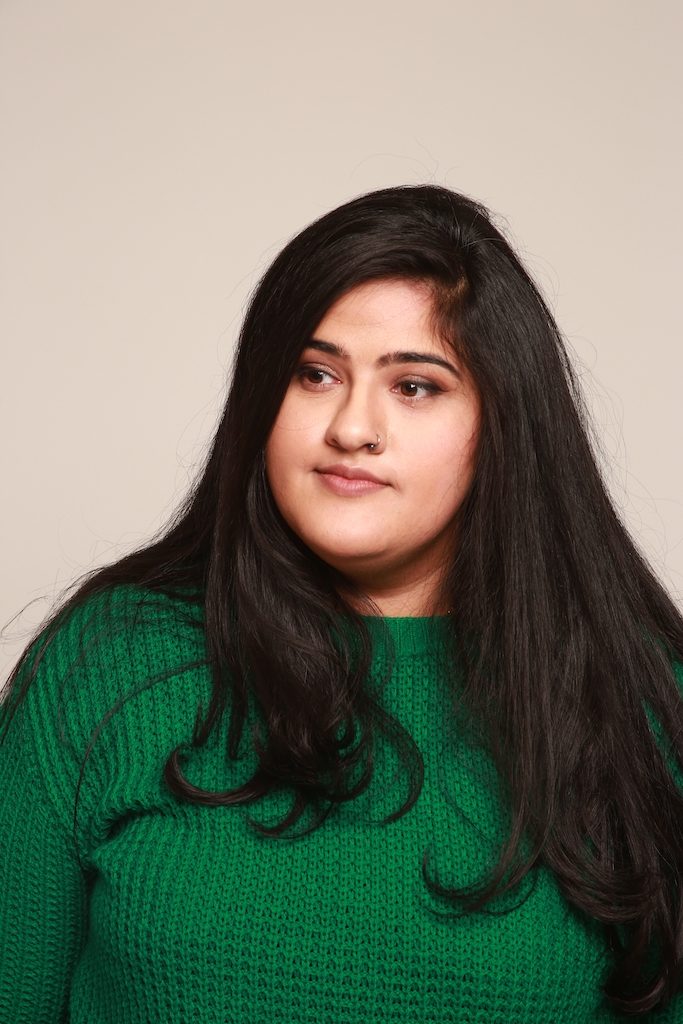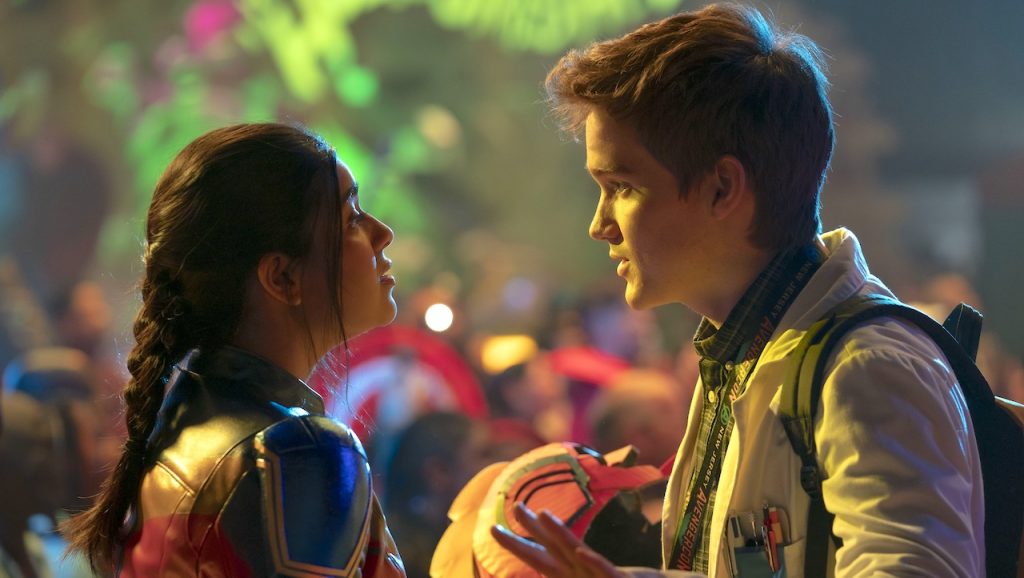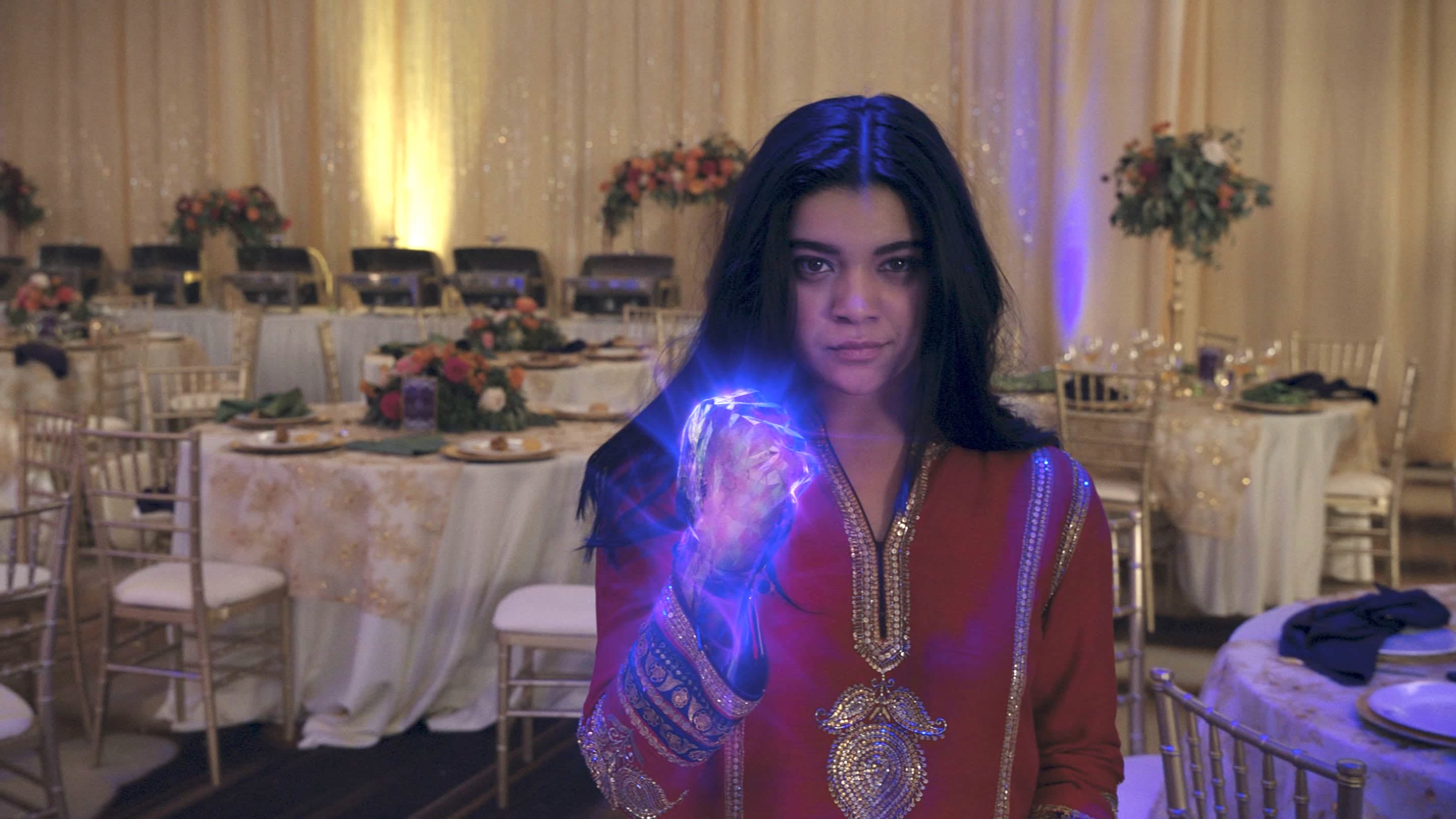When asked why she got into writing, screenwriter Bisha K. Ali joked that it all started with a “teacher who gave [her] too much validation.” She said, “I wrote a short story when I was eight and the teacher made me read it to the class. They were wondering who this kid was who had been sitting in the corner for the past six years.”
This early validation, along with a family and cultural love for storytelling from her British-Pakistani background, is “fundamentally” a part of her. “Then, also the fact that I was an indoor kid raised on television and movies. That was my obsession as a child. I just didn’t know there was space for me until I got older.”
Despite being a quiet kid, Bisha didn’t see herself as introverted, just “indoors.” So moving from solo projects to the writers’ room wasn’t particularly overwhelming for her. “I don’t know that I’m an introvert necessarily, just an uncool kid,” she joked.
“I think I feed off the energy of other writers a lot. Being in the writers room is the best. It’s more fun when you’re not the head because you’re just pitching ideas and that’s fun and exciting. When you’re the head, you have to figure out all of it. Even now, if there’s an opportunity to dip into a writer’s room, it’s the best. I love that environment. But then I also need five days of nothingness. So I need both.”

Bisha K Ali. Photo by Linda Kupo
As a screenwriter, Bisha is known for Sex Education, Four Weddings and a Funeral (2019), Loki, and creating the new series Ms. Marvel for Disney Plus. “It’s always been about storytelling for me, in one form or another.”
Breaking In
“I had quite an interesting journey. I started this side of the Atlantic, in the U.K. So it’s a very different, much smaller industry, certainly at the time. Now there are some writers’ rooms in the U.K., but back then, that wasn’t a thing. Sex Education having a writers’ room was new and rare.”
“I lucked out in terms of timing. Now it’s much more popular to have writers’ rooms in the U.K. Getting into that room was really the first step and everything snowballed after. I was doing stand-up for about eight years [at the time]. Maybe ten years. But that process gave me a thick skin and then with stand-up, you can write something and get immediate feedback. You can’t get that same hit from the writers’ room.”
All of these skill sets came together to launch Bisha into a series of more notable writing assignments. “Producers would come to comedy shows. One of these producers — Amy Annette — said, ‘I fully believe you have scripts. Please show them to me.’ And she was right. I was sitting on a pile of scripts.”
Soon, a table read was set up, funded by the network. There were agents and producers in the room. “It wasn’t about bringing the show to television. It was more about showing this writer to the industry. Off the back of that, I found my agents in the U.K.” Soon after, she was approached by American agents and then she got a job writing for Four Weddings and a Funeral.
“I call it snowballing, but it’s all of the little tiny things you’ve been working on by yourself and then it suddenly starts to snowball together.”
A Pile of Scripts
Back then, the “pile of spec scripts” she wrote covered a wide variety of topics. “Some will never see the light of day,” she joked. “Some were pure sitcom. Some were weird in-between stuff, like a sitcom about a woman who’s ovaries are killing her. I’ve grown up with PCOS (polycystic ovary syndrome) and you cut to the ovaries talking to her and weird stuff like that.”
All of the scripts were meant to show off her “personality” and “angle through the world.” She said, “Then there was some hard sci-fi that you would never produce with a new writer. It was more like the highest ambition of what I want to do. I’ve committed to myself I will make that show one day. So it was a mix of all the different things I wanted to do.”
“I think people tend to get loads of advice on focusing on one genre or one space, but for me, I don’t know how to do that, so I’m going to focus on the things that make my heart sing and hopefully someone will connect to some element or part of me and we’ll see what happens. I think that helped me get the first job and then move into genre.”
Bisha’s heart is in genre, which she showcased in her high dollar sci-fi spec. “It wasn’t Marvel, to be honest. That wasn’t the big goal. I’d look at the work of Guillermo del Toro and he’s just a hero. I love everything he’s ever done. I also loved Severance. I think I interviewed early doors around the same time for Severance and Loki. The Loki came through quicker, but I would have loved to been in that room as well.”
She knew Marvel was a unique opportunity. “To see the inside of that, I knew I could experience something I couldn’t experience anywhere else. That was a big part of that decision as well. I’m really drawn to darker projects, worlds that are left of center.”
Loki and Beyond
Bisha is now intertwined in the Marvel genre. “I would say Loki is deeply connected to what we’re about to see [in Marvel’s Phase 4]. Even in the features that we’ve seen. By the end of Loki, we fucked everything up. I would argue we’re intricately involved in the wider MCU and when things appear not connected, some things will shake out in the wash.”
“In terms of what I learned in the Loki writers’ room, I think having so much interconnection of where the show ended up and the fact that we had a character who is preexisting and beloved, there’s a responsibility and excitement. He’s been through this, this and this. What journey can we take him on over the course of six hours—collectively a huge amount of screen time.”
Creator Michael Waldron and his writers involved Loki continuing his role as the “God of Mischief” in a timeline involving life after Avengers: Endgame. “We’re spending more time with this character than we’ve ever spent before. We wanted to lavish that time.”
Bisha was in charge of writing Episode 3: Lamentis, where “Loki finds out The Variant’s plan, but he has his own that will forever alter both their destinies.” She said, “That was really joyful and I loved doing that. Seeing that interconnectivity and how that fits into the MCU.”
Writing Loki and Ms. Marvel
Loki is particularly a unique character because he’s more of a villain than hero, but the series really allows for him to explore the gray. “I don’t think it’s good guy, bad guy. I can’t speak for the whole room but I think that’s too facile for six hours with a character, to make it more 3D.”
She continued, “We’ve been through good and bad. He’s fundamentally responsible for horrible, horrible stuff, but where we pick up, what are his desires and how do we unwrap this character from that point forward with the time we have? With Loki, we were thinking more, what has he not had?”
“If he’s a bad guy to the public, what has led to that in a real way? Why is he that person? Is that his nature or the result of everything he’s experienced? What has he never had before or what can we bring close to his proximity and how will that change him?”
Thanks to this job, she got the chance to pitch for Ms. Marvel. She tossed her name into the ring as early as she could and luckily, got the chance to pitch. “Off the back of that meeting, I eventually pitched my approach, the character arcs, please love me, and goodbye.”

Ms. Marvel/Kamala Khan (Iman Vellani) & Bruno (Matt Lintz) Photo by Daniel McFadden/ Marvel Studios
“Then it was kind of rock and roll from there. The thing with Marvel is that they’re going to make the shows they’re going to make regardless of if I exist or not. It’s who is going to tell a version that can bring something to it, but also be a new edition and fit into what exists already.”
As Jeremy Slater told us in the Moon Knight interview, there are various complications pitching somewhat blind to Marvel, a company who always has secret projects in the works. “Her power set was one of those issues, because we were told it would be different from the comic, but not what they would be.”
The trailer reveals Ms. Marvel’s powers to be “in her hands,” a cosmic power able to alter shape and size of objects. “I can’t go into specifics, but I picked one specific power, but they were [using it elsewhere]. So those things change, but something that doesn’t change is the heart of the story and the character’s journey.”
Limitless Ambition
“I wasn’t worried about the heart. I was annoyed by the popcorn,” she said about the scale of Marvel, seeing as whether or not a show is good or bad, millions will watch it. “You want a representation of the scale, but you also want to do it our way. We’re the Little Engine that Could and we reveal on being that underdog.”
The writers knew what the character knew: “We were going to do things our way. It married up and I didn’t really feel pressure about millions of viewers. The pressure actually was about the kinds of viewers this show would get and who we’re representing and the make-up of that audience specifically. We don’t want to let our communities down.”
I wasn’t worried about the heart. I was annoyed by the popcorn – Ali on Marvel
As for her current and early work ethic, she said, “I just really wanted to do it. Fundamentally, I just really wanted to do it. It got to a point where I was working in so many different fields and I know what it is to work in a job too emotionally fraught to continue or you don’t fit with what that job is. I spent time doing those things but it’s sort of a deep sense of hopelessness and I really loved it—creating something from scratch.”
Bisha loves the challenge of trying to communicate something massive in her head and bringing it down to the page. “Then it’s nothing like what’s in your head, so how can I revise it? How can I refine it? How can I share it with trusted creators who are going to add to it and help me build it and grow it. If you don’t like that process of writing, don’t do it. It’s too painful.”
This interview has been condensed. Listen to the full audio version here.

